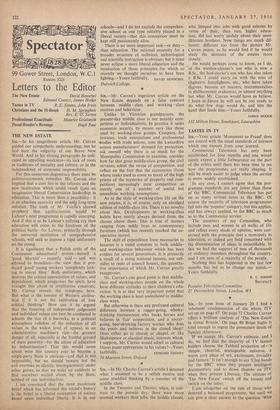SIR,—Mr. Curran's ingenious article on the New Estate depends on
a false contrast between middle - class and working - class motives and behaviour.
Unlike its Victorian grandparents, the present-day middle class is not notably com- petitive or individualistic. In practice it seeks economic security by means very like those used by working-class groups. Compare, for instance, trade associations and professional ahodies with trade unions, note the Lancashire cotton manufacturers' demand for protection, ask oneself why there is so much for the Monopolies Commission to examine, consider how far that great middle-class group, the civil servants, admit the virtue of competition, and reflect on the fact that the economists (from whose ranks used to come so many of the high priests of the mysteries of property and com- petition) increasingly treat competition as merely one of a number of useful but unrealistic working assumptions.
As to the style of working-class life on the new estates, it is, of course, only an abridged edition of middle-class life. There is no novelty about this. Developments in working-class habits have nearly always derived from the classes above them. This is true of matters ranging from teddy boys to contemporary furniture (which has recently reached the co- operative stores).
The shift of expenditure from necessaries to luxuries is a trend common to both middle- and working-class behaviour which has been evident for several generations. It is primarily a result of a rising national income, not sub- sidies to rents of council houses, the quantita- tive importance of which Mr. Curran greatly exaggerates.
Mr. Curran's one good point is that middle- class and working-class people on the whole have different attitudes to their children's edu- cation. It is at that very important point that the working class is least assimilated to middle- class ways.
But otherwise is there any profound cultural difference between a rugger-going, whisky- drinking businessman who backs horses and believes in 'fair' competition, and a soccer- going, beer-drinking factory worker who does the pools and believes in the closed shop? Does either go to church or chapel, or like Shakespeare or classical music, interests which, I suppose, Mr. Curran would admit as cultural litmus paper appropriate to his values?—Yours
*










































 Previous page
Previous page